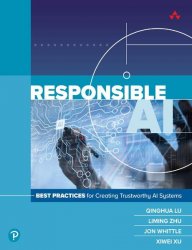Responsible AI: Best Practices for Creating Trustworthy AI Systems (Final)
- Добавил: literator
- Дата: 15-07-2024, 20:20
- Комментариев: 0
 Название: Responsible AI: Best Practices for Creating Trustworthy AI Systems (Final)
Название: Responsible AI: Best Practices for Creating Trustworthy AI Systems (Final)Автор: Qinghua Lu, Liming Zhu, Jon Whittle, Xiwei Xu
Издательство: Addison-Wesley Professional/Pearson
Год: 2024
Страниц: 314
Язык: английский
Формат: True PDF, True/Retail EPUB, Mobi
Размер: 10.1 MB
AI systems are solving real-world challenges and transforming industries, but there are serious concerns about how responsibly they operate on behalf of the humans that rely on them. Many ethical principles and guidelines have been proposed for AI systems, but they're often too 'high-level' to be translated into practice. Conversely, AI/ML researchers often focus on algorithmic solutions that are too 'low-level' to adequately address ethics and responsibility.
In this timely, practical guide, pioneering AI practitioners bridge these gaps. The authors illuminate issues of AI responsibility across the entire system lifecycle and all system components, offer concrete and actionable guidance for addressing them, and demonstrate these approaches in three detailed case studies.
What Is Responsible AI? As with many terms that refer to emerging technologies, the term Responsible AI is loosely defined. Indeed, a set of terms is currently being used in the community to mean largely the same thing: Responsible AI, ethical AI, trustworthy AI, AI for Good, values-driven AI, and, more broadly, digital humanism. At their heart, all these terms have the same underlying objective: to inform how we can develop, adopt, and maintain AI systems in a way that has a positive benefit on society.
Unfortunately, there are far too many examples where AI—or more broadly, automation (we come back to this distinction later)—has led to negative societal impacts. These range from life-threatening negative impacts, such as driverless cars leading to road deaths and autonomous drones killing humans, through serious but not life-threatening impacts such as AI-based discriminatory sentencing at parole boards, inaccurate assessments in automated debt recovery systems, and bias in automated exam grading systems, all the way to less serious—but still important—cases such as price gouging by automated airline pricing systems in the aftermath of natural disasters or discriminating against minority neighborhoods when offering retail pricing discounts using AI algorithms.
Writing for technologists, decision-makers, students, users, and other stake-holders, the topics cover:
• Governance mechanisms at industry, organisation, and team levels
• Development process perspectives, including software engineering best practices for AI
• System perspectives, including quality attributes, architecture styles, and patterns
• Techniques for connecting code with data and models, including key tradeoffs
• Principle-specific techniques for fairness, privacy, and explainability
• A preview of the future of responsible AI
Скачать Responsible AI: Best Practices for Creating Trustworthy AI Systems
Внимание
Уважаемый посетитель, Вы зашли на сайт как незарегистрированный пользователь.
Мы рекомендуем Вам зарегистрироваться либо войти на сайт под своим именем.
Уважаемый посетитель, Вы зашли на сайт как незарегистрированный пользователь.
Мы рекомендуем Вам зарегистрироваться либо войти на сайт под своим именем.
Информация
Посетители, находящиеся в группе Гости, не могут оставлять комментарии к данной публикации.
Посетители, находящиеся в группе Гости, не могут оставлять комментарии к данной публикации.
